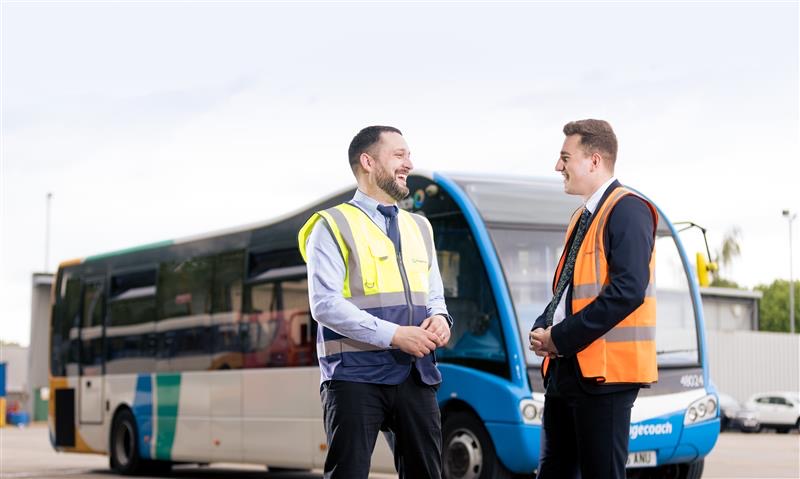Success as a manager within the bus industry demands a commercial head and people skills. Here’s why nurturing young talent is so important
The start of the year is when many bus operators start looking for the next cohort of young managers to begin their training.
With the industry in a state of change, from the move to net zero to dealing with the shifting landscape of customer travel and changing requirements of staff, managers must be able to balance commercial expectations with excellent people skills.
Here, several operators reveal why it’s important to bring youth through for the task, and how they nurture that talent to ensure they make garages and businesses commercially successful as well as great places to work.
A changing role
Stagecoach announced the search for new members of its graduate training scheme in January. The scheme gives the opportunity for 10 people to join the operator’s UK-wide business from September.
Head of People Services and Talent, Tracey Smyth, explains that the structure of the company’s management provides opportunities for the graduates to elevate their careers as they work through various roles, which begin as first level management roles all the way to operations and engineering directors and managing directors.
The graduates spend their first year learning on the job about the business before moving into an ‘acting up’ role at an assistant manager level, which involves either planning and directing for the operations side, or being behind the scenes in engineering.
Because management roles at those early levels are touch points for front-line people, Tracey reveals that, over time, there has been more emphasis on what impact managers have on their staff, driven through engagement surveys. “Potentially, [managers] have prioritised getting buses out on time and making routes profitable,” she says. “While that’s still important, there has been more of a shift to the difference they make for the employee experience and how they develop their people.”
That impact can include nurturing a more diverse and inclusive workforce, encouraging people to be their true selves at work, and embracing the value that that brings. To that end, Stagecoach is working with diversity, equity and inclusion and social mobility experts in the recruitment space to support aspirations for its senior future leaders, to ensure they are representative both of its customers and its staff.
“It’s also around how we can bring people into our business more flexibly,” adds Tracey. “To recognise that not everybody wants to, or can be, a driver or engineer full time. And if we are talking about increasing diversity, how we can be more flexible in our approach, to ensure we are getting the best of the talent that’s out there.”
From a leader perspective, this means a stronger focus on engagement and communication. Understanding the needs of staff and having wellbeing at the front of mind is crucial. Team leaders can make a genuine difference with skills that make them able to motivate and engage others. “We’re looking for our leaders at all levels to be more emotionally aware of what they say and do, the impact it has on others, and how we work much more inclusively together in the operating companies to deliver. We focus on these areas through our graduate development programme, and equally, our internal development routes,” Tracey adds.
The volume of candidates already applying to the scheme has been impressive and Tracey reveals Stagecoach is confident that the programme will be engaging and tempting to individuals. Sustainability and public transport’s impact on net zero are being leveraged as topics that appeal especially to the graduate population. “There is research to suggest that individuals want to join organisations that take sustainability seriously,” she explains.
In addition to the operational experience provided by the two-year course, Stagecoach looks to equip candidates with a professional external qualification. “That’s to enable our people to be great not only at the job that they do, but to have the confidence and the skillset to lead people effectively and make a difference,” says Tracey.

New blood, new ideas
One former member of Stagecoach’s graduate scheme is Transdev CEO Alex Hornby. Now co-patron of the Young Bus Managers Network, he has long espoused the need for young blood in the bus industry, and continues to help arrange events and attract speakers to the Network alongside co-patron Roger French.
He reveals that hiring young people is part of efforts by Transdev to reflect its user profiles and attract a broad range of people to its business. Doing so, he argues, helps turn customers into long-term users. There are also advantages with new skills brought by young people – which, according to Alex, include being technically and innovation minded.
Alex adds that he enjoys the idea of being challenged by “new blood” into the business. “As much as I get a kick out of mentoring and developing new young people in the industry, I get a similar amount of satisfaction when we are challenged on new things,” he explains. “As you begin to get older, you need that challenge all the time, to make sure you’re in touch with what new customers want, in the hope that – particularly when young people come to bus (and often they do for reasons that may not necessarily be of their own choice) you can turn them into long-term bus users.
“The idea that our colleagues reflect that age of user profile is critical as part of our desire to be a company that can gain growth with customers and reflect what customers want.”
When it comes to the type of candidates Transdev recruits, Alex says the company seeks out “people people”. Those who are both empathetic, but know how to performance manage, demonstrate a valuable skill. It is also a skill that is not always gained by experience, but by being down to the type of person someone is. Hiring people with those abilities has allowed the company to “excel” during periods where people management has been crucial, for example during the pandemic. “Because that was the belief of our managers, all we had to do during the pandemic was turn the volume up on that particular issue, and make sure we were there for our colleagues more than ever,” Alex adds.

The Academy by Transdev, which recruits and trains people into the business, performs a number of apprenticeship programmes in management and for those already in the business looking to progress. The business also has its StepUp programme where people are invited every year to indicate what development they would like. That’s not necessarily management, nor is it a fixed programme – it can also be about progressing into a new department.
“It’s designed around what our colleagues need in order to develop themselves,” explains Alex. “It may be as simple as a driver wanting to understand scheduling better. Over the past five years we’ve had 12 people progress through, and they are now working at a higher level than what they were previously. The key part of it was about designing an individual programme for each person with a destination of what they want, and about matching what we need as an organisation with the desired ambition of the staff member, building a programme that gets them to that point.”
Much of the programme has involved leaning on apprenticeship training, particularly in human resources. Two persons over the age of 50 have progressed through the course, and are now service delivery managers – showing it’s not just youth that are encouraged to look for new career paths. “We do it to encourage people to broaden their horizons and give them confidence,” says Alex. “That’s unique in a company. This isn’t a job ad that goes on the wall – our people tell us what they want, and we see how we can match that to the needs of the business.”
Owning your own development
Kelly Moore is the UK Learning and Organisational Development Manager for National Express. The company runs its graduate scheme every year from September and seeks between three and eight graduates. Recruitment began in January.
Because senior leaders are empowered to oversee the management of garages, adverts are tailored to people who are commercially minded, data-driven, and people and customer focused. “It’s not an easy win,” Kelly says. “One of the things we push is to be an employer of choice, and to have employees that are engaged.”
Being keen to learn and enthusiastic, with good communication, are key attributes that National Express looks for. But graduates must also be flexible to work with some ambiguity as its business continues to grow. When hiring, the company looks for people who have sat on groups at university, acted as a mentor, and shown a wider desire to participate and be part of the community. “It’s important in our business to want to do more,” Kelly says. “As well as their placements we set graduates challenges to find an improvement to present to executives. Last year it was to encourage young people into transport, and homeless into work. We need people that have that enthusiasm.”

The company puts graduates into three-month placements over an 18-month period, which covers everything from operations to communications, finance and human resources. That rotational scheme aims to give them a fully rounded view of where their strengths lie by the end of the 18-month period. For graduates who choose to go into operations, PCV training provides them with the skills needed to better relate to the driver experience.
Kelly says the rotational scheme helps graduates find their niche and gives them a say in where they want to go within the business: “Having three-month placements gives our graduates the opportunity to find out what they’re good at.”
Those on the scheme are aided by support at a senior level. The mentoring works two ways, according to Kelly, helping directors “understand a different generation’s way of thinking”. Buddies – a former apprentice or graduate – also meet with the new starter every month. That culture of nurturing continues even when the graduates go into full-time roles. Theory and context is given by a professional manager’s award with Aston University.
Having training tailored to the graduates in this way allows them to “own their own development” – something Kelly says is important in an age when many young people demonstrate a ravenous desire for career progression. “We will do everything we can to get them to that level” she adds.


























